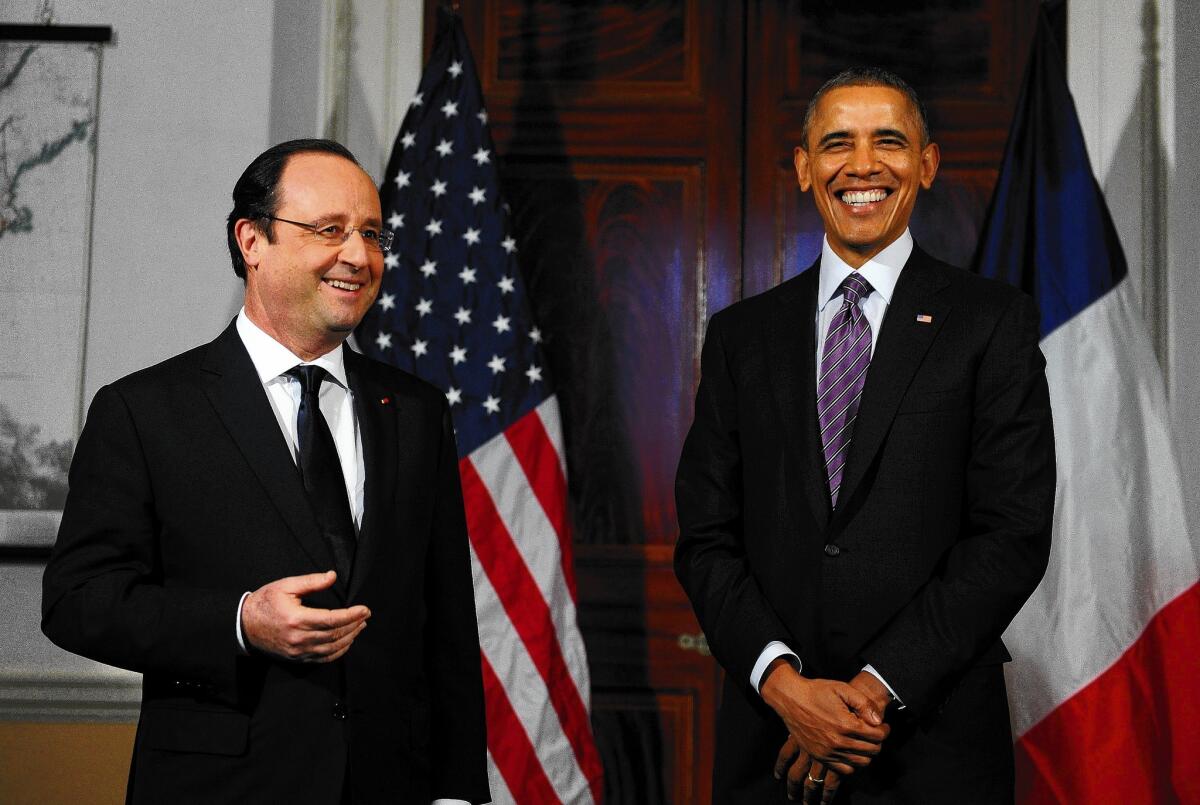State dinner for France’s Hollande may get awkward after his breakup

- Share via
WASHINGTON — President Obama’s first state dinner was memorable for who showed up uninvited. His sixth, a high-glitz affair for the president of France scheduled for Tuesday, may be remembered for who was initially invited but did not attend.
Obama opened the White House doors Monday to French President Francois Hollande — but not to his former first lady, journalist Valerie Trierweiler. Hollande’s first state visit to the U.S. comes after he announced his breakup with Trierweiler amid a swirl of reports linking him to an actress.
That development threw preparations into confusion. Two days of events culminate in a state dinner on the White House lawn for more than 300 people.
Like any good host, the White House did its best to make Hollande comfortable, dismissing the trouble of crossing Trierweiler off the guest list. Officials would not comment on whether they had tossed out invitations bearing Trierweiler’s name. They would not say who would take her coveted place next to the president at the head table. They released details on the entrees (American), the entertainment (singer Mary J. Blige) and the dessert (whimsical, including orange-zest-dusted cotton candy).
On Monday, the presidents traveled to Charlottesville, Va., to tour Thomas Jefferson’s Monticello estate, keeping the focus on the storied Franco-American alliance. (Some saw ties to infidelity even there, however: Historians believe Jefferson fathered children out of wedlock with Sally Hemings, a slave.)
For the world of efficient and polite protocol experts, a guest of honor traveling without a companion is nothing compared with the embarrassment of party crashers like the ones who talked their way into Obama’s dinner for the Indian prime minister in 2009.
“This is not difficult to manage,” said Anita McBride, former chief of staff for First Lady Laura Bush, who now heads the Center for Congressional and Presidential Studies at American University. Sure, the image of the two couples standing in their finest at the North Portico will be a person short, but c’est la vie.
“This is an interesting visit, isn’t it?” said Mary Mel French, chief of protocol during the Clinton administration and author of “United States Protocol: The Guide to Official Diplomatic Etiquette.”
At one time, a head of state bringing a guest who was not a spouse would have caused headaches for the Office of Protocol and the Secret Service, French said. That has changed with the times as more heads of state have remained unhitched. The Secret Service now typically gives companions, married or not, the same level of protection as spouses.
Indeed, though often described as dictated by strict protocol and decades of tradition, state visits are also shaped by the times. Politics, personal whim and predicaments all factor in. Franklin D. Roosevelt scandalized some Americans by staging a picnic with hot dogs for Britain’s King George VI during a state visit in 1939. President George W. Bush hosted many foreign leaders at his ranch in Texas, a reflection of his preference for casual, personal interaction, McBride said.
President Clinton held 23 state dinners, a reflection of his love of a good Washington schmoozefest. By contrast, and perhaps reflecting the differences in their personalities, Tuesday’s state dinner is Obama’s sixth. White House officials say the low count is a result of tighter budgets and sensitivity to tight economic times.
With fewer parties, each becomes more important — a more meaningful gesture of gratitude or praise for an ally the White House wants to spotlight, said one senior administration official, who asked not to be named discussing the White House’s approach to state visits.
In this case, the ceremonials are a sign of appreciation for an ally that has stuck with the Obama administration when others, particularly in Europe, have not.
“Let’s just say that we’ve come a long way from freedom fries and are now working together on multiple continents,” a senior administration official said.
The White House kept a lid on discussion of the French president’s personal life, with a senior official saying the administration is “studiously neutral.”
After a magazine published photos that appeared to link Hollande to French actress Julie Gayet, Trierweiler was hospitalized for a week.
The incident reignited a debate in France on privacy and the role of the press.
Hollande promised to clarify his relationship with Trierweiler before leaving for the U.S. On Jan. 25, he announced he’d be traveling alone.
He has tried to cast his U.S. visit as a reboot. “For President Hollande, it comes at a useful moment for him to show him operating at a world stage,” said Erik Goldstein, a professor of international relations at Boston University who has written about state visits.
Obama has political goals too. He invited Republican members of Congress to the dinner, part of a continued attempt to forge goodwill with his opponents. Republicans have generally declined such overtures. But this time, at least one didn’t: Rep. Paul D. Ryan (R-Wis.) plans to attend with his wife, Janna.
The president’s staff expressed hope that presages a thaw in the GOP resistance to socializing.
More to Read
Sign up for Essential California
The most important California stories and recommendations in your inbox every morning.
You may occasionally receive promotional content from the Los Angeles Times.











